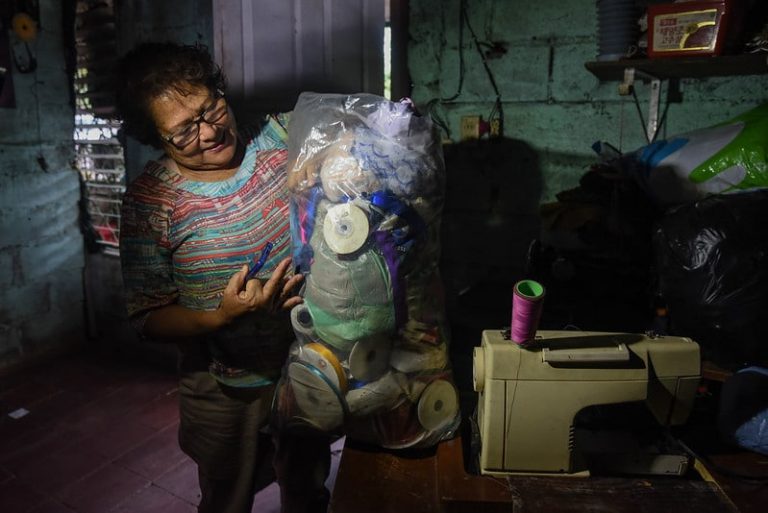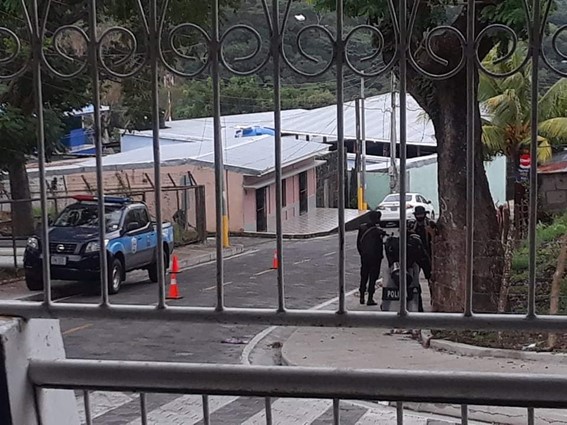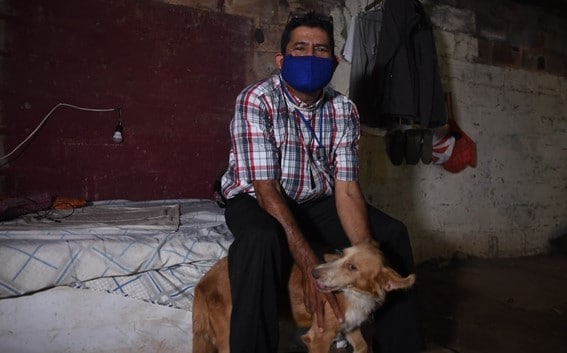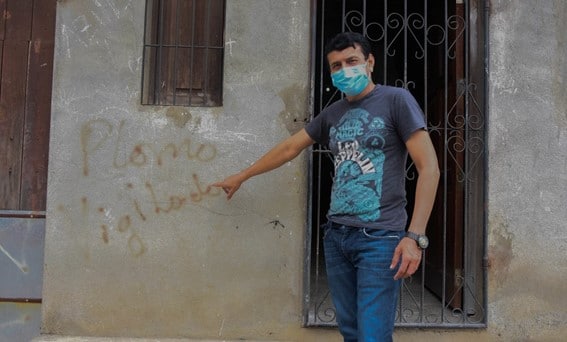19 de enero 2021

The Return of the Military

PUBLICIDAD 1M
PUBLICIDAD 4D
PUBLICIDAD 5D
Opponents face unemployment or economic losses in their businesses, due to continual harassment from the police and paramilitary.

Nicaraguan opponents of the Ortega regime are living under siege
Seamstress Flor Ramirez has turned off her sewing machines. Lawyer Moises Jimenez can’t enter any of the State institutions. Figurine designer Ariel Icaza can no longer receive clients in his home. Caterer Geraldine Jarquin has lost over half her customers. All four are Nicaraguan opponents of the Ortega regime. All are living under siege, their homes surrounded by a cordon of police and paramilitary.
The police cordons stationed daily around Nicaraguan opposition figures has brought them economic difficulties. They can’t work or continue with their businesses. The siege and police persecution of certain opposition leaders and activists has intensified in the last few months. However, there are also many grassroots citizens who’ve been under siege from the police since 2019.
“I’ve now been under constant guard for 17 months. They stopped for two months last year: in September and October, they only came on weekends. The rest of the time, they’ve been here every day,” affirms Flor Ramirez. She offers some further details: “Before, they’d be here from six in the morning to six in the evening. Now, they come in the very early morning and leave at noon.”
Flor Ramirez is 64. She captured the popular imagination during the civic protests, with her elegant blue and white traditional dress, or huipil.. Since 2018, she’s been illegally detained five times. The last occasion was on December 6th, when she was in a taxi.
She and her daughter had a home sewing business in a Managua neighborhood. Unfortunately, the constant police vigilance has forced her to close her locale.
“The clients stopped coming, because the police are always there in front of my house. They write down the license plate numbers of the cars or motorcycles. Then they persecute the people. They stop them or take away their driver’s licenses,” the opposition figure declares.
“If they see anyone entering or leaving with a backpack, they search it. All that means that people have stopped bringing us work. They’ve left me just sitting here, a prisoner in my house,” she adds.
Ramirez opened her sewing business over fifteen years ago, after quitting her job as supervisor in the free trade zone. Monthly income from her home business had risen to nearly US $300. [note: a modest, but decent income in Nicaragua].
“Our plans included contracting two more people to work with me. I had the sewing machines ready and everything, but our plans all fell apart with the police siege. The machines are here, in storage. I can’t work. It’s not that I don’t want to, but I can’t. The police don’t let me work, as they’ve done with many dissidents,” Flor laments.
The Blue and White Unity movement and the Civic Alliance monitor the sieges taking place. They’ve documented 80 people in this situation. All are under de facto house arrest, some permanently and others at certain days and times.

Police officers and riot squad agents mount a daily guard around the Boaco home of dissident Geraldine Jarquin. Courtesy photo
Small businesswoman Geraldine Jarquin – like Ramirez – saw her customers scared off by the police. The opposition figure lives imprisoned in her home in the city of Boaco. The constant police presence keeps her from working in her catering business. Geraldine began this business in 2009, after being laid off from the National Assembly.
“The Christmas season is the peak season for us (in the catering business). It’s the most important month for earnings. However, this year I had no events to cater,” Jarquin states.
“The food I make at home is for take-out, so people can entertain guests in their own places. That business went from 100%, based on what I served in 2019, to about 30% in 2020. That weakens my economy, weakens my family circle,” she specifies.
Jarquin calculates that last December she lost at least US $570 worth of business, as compared to December 2019.
Geraldine Jarquin has had to put up with the police siege together with her children. “At one moment we counted 58 police officials here, on this block in front of my house. Sometimes they close off access with traffic cones, and absolutely no one can go by,” she says.
Attorney Moises Jimenez is another opposition figure under siege. He lives in Leon, but since mid-2019 has been unable to work. Each month he loses some US $570 dollars in earnings due to the police harassment and persecution.
“I’m going through a hard time economically. The dictatorship’s policy is besiegement, persecution and the elimination of all constitutional rights,” Jarquin declares.
“My legal specialty is Registry Law. I have over 25 years of experience in this. As a result, my activities have been truncated. If I’m there (at the state institutions), police and paramilitary block [the clerks] from serving me.”

Attorney Moises Jimenez pats his dog, his only companion in a Leon safe house. Photo: Nayira Valenzuela
Jimenez had to leave his home in the predominantly indigenous neighborhood of Sutiava in Leon. He left to avoid being taken prisoner. “I’ve been in a number of safe houses since they [police agents] raided my house. Two months ago, they burst into the house where I live with my children, without a legal order. They were violating all procedures and asking for me,” he relates.
“I’m afraid of being captured. The procedure they’re using is to invent accusations of drug possession, drug trafficking or arms trafficking. That’s what they expressed to all my children,” he notes.
Jimenez was illegally jailed for some 5 months in 2019. He was stopped while leaving the Managua City Hall in January of that year, and he wasn’t released until May.
“They had me completely abducted, because I was never brought before a judge. There’s no file on me, where they confirm that I was presented before a judge. They violated Nicaragua’s penal code. This stipulates that 48 hours after a detention, [the detainee] must be presented to the judicial authorities,” Moises Jarquin explains.
In 2006, Moises formed part of the Sandinista Front’s electoral structures. These elections were the ones that returned Daniel Ortega to power.
Ariel Icaza is another released prisoner from Leon who’s suffering relentless harassment at his home. Ariel has a home workshop where he makes religious figurines.
He was detained in November 2018 and accused of murder, theft, kidnapping, drug trafficking and arms trafficking. Ariel was taken once to court in Managua, but there was no hearing.
He was freed on May 20, 2019. However, one month later the Ortega regime’s police and paramilitary began a permanent siege of his home.
The economic cost [of the constant police presence] has been great. The customers have stopped coming, because they’re afraid to come and buy. They [police] take their pictures, and they’re afraid they’ll be accused of something they haven’t participated in,” says the artisan.
“The clientele isn’t coming to look at all the things we have, the types of religious images there are. So, we can’t easily promote the sale of that image, of that figure,” he states regretfully.
Icaza’s house has been marked with the word “lead” [as in lead bullets]. A group of paramilitary broke the main door. Last Saturday, January 9th, his house was illegally ransacked by the Leon police.

Artisan Ariel Icaza points to the words “plomo” [lead] and “vigilado” [being watched] scrawled on the wall of his house. This common mark is used to threaten the opposition. Photo: Nayira Valenzuela
“We saw it coming – that this year (2021) it [the harassment] was going to intensify. And what we expected, happened. Two patrol cars and three motorcyclists came. They entered our house on the excuse that they were looking for weapons. Then they began to look through the whole house without finding anything,” Icaza describes.
“What really bothered me is that they took the three cellphones that my daughters used,” he adds.
Opposition organizations have begun to monitor the situation. According to their data, the national police and paramilitary have besieged up to thirty houses simultaneously in a single day.
Fifty-two of the opposition leaders subjected to home siege are members of the Blue and White Unity. The Civic Alliance reports from 12 – 15 cordons and organized police persecution daily.
Despite the harassment and the daily siege, the opposition members reaffirm their determination to stand firm before the regime. “Not to cede.”
“We must bear up and try – one way or another – to get ahead. We’ve already proven we’re a people who fight. Even with the police right outside my house, I’m going to get ahead. Neither me nor my family, with God’s help, are going to die of hunger,” Geraldine Jarquine declares.
Icaza insists they’re not going to stifle his civic protest and demand for free elections with their siege. “Thank God, I have family that supports me. Just like me, they’re always in the struggle. Despite all that they [police and paramilitary] are doing, we’re not going to be intimidated.”
Flor Ramirez asserts that she’ll stay in her house and “confront” the police siege. Because they’re people who are trying to keep us anxious, in fear, and for us to run away. I’m not afraid. Not because I’m brave, but because I know my rights as a citizen to protest against what I see as wrong.”
Moises Jimenez recognizes that he’s had “the desire” to go into exile. But, “like they say, if I already took the first step, I have to take a second and a third. To keep going, until Nicaragua is free of this dictatorship.”
Archivado como:
PUBLICIDAD 3M
Confidencial es un diario digital nicaragüense, de formato multimedia, fundado por Carlos F. Chamorro en junio de 1996.
PUBLICIDAD 3D